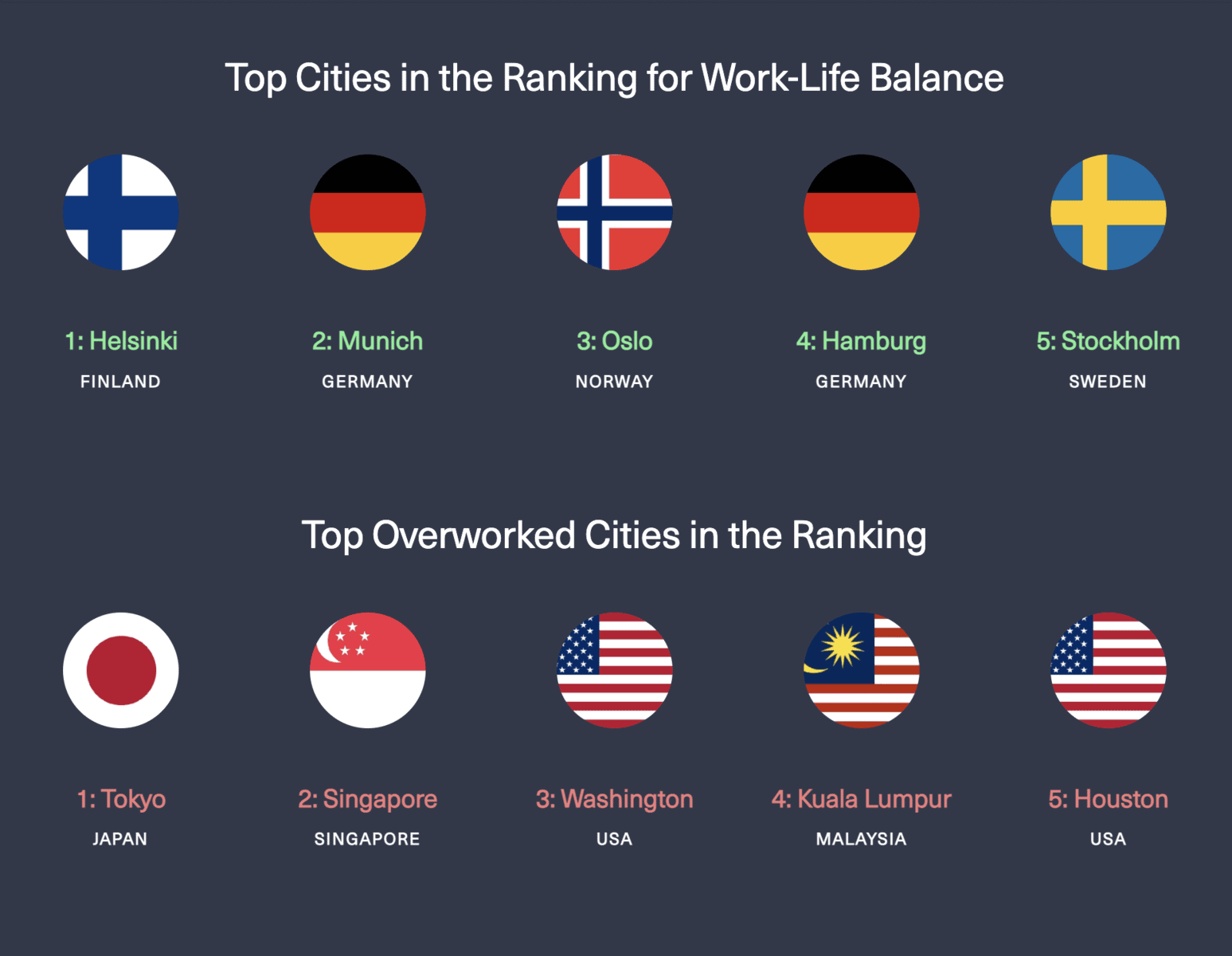Last Updated on 2023-02-15 , 10:30 am
Up till this day, I’m still searching for a certain person.
A person who will say, “work-life balance is great,” whilst working in Singapore.
Even the most satisfied people with their jobs will say the job is great and it’s satisfactory, but they won’t ever just straight up say the work-life balance is good.
So, to nobody’s surprise, a survey lists us as 2nd most overworked country.
Singapore 2nd Most Overworked, 32 Out Of 40 In Work-Life Balance
There are 40 cities in the survey, which are “in-demand metropolises worldwide with sufficient, reliable, and relevant datasets” and “known for attracting professionals and families for their work opportunities and diverse lifestyle offerings.”
And if you’re thinking of the top work-life balance to plan your migration, it’s Helsinki.
To nobody’s surprise, the only city more overworked than Singapore is Tokyo. I mean, at least we don’t die from Karoshi. Here’s an infographic:


Hold up, Kuala Lumpur 4th most overworked?
Work-Life Balance Index Based On 3 Categories
Before you go dismissing the survey because of KL, they used three metrics in the survey:
-
Work Intensity Score: Arrival Time, Hours Worked/Week, ≥ 48 Hours of Work/Week (%), Minimum Vacations Offered, Vacations Taken, Unemployment (%), Paid Maternal and Parental leave (days), Commuting (one-way, minutes)
-
Society & Institutions Score: Social Spending (% of GDP), Healthcare Score, Access to Mental Healthcare Score, Gender Equality Score, LGBT Equality Score
-
City Livability Score: Safety Score, Happiness Score, City Stress Score, Outdoor Spaces Score, Air Pollutants (µg/m3), Wellness & Fitness Score, Leisure Score
Work-Life Balance Score = [WEIGHTED AVERAGE(City Livability factor scores) + WEIGHTED AVERAGE(Society & institutions factor scores)] – WEIGHTED AVERAGE(Work Intensity factor scores)
Then they use the magic of math called weighted average to come up with a final score.
So the KL being 4th most overworked is most likely based only on Work Intensity Score. In fact, if we put everything together, KL is actually 40 on the list with the worst work-life balance.
But enough of KL, and more to Singapore.
Singapore Stats
You can, of course, check the full data with the 40 cities here, but this is Singapore’s data. Paid maternal and parental leave was left out below because the results seemed wonky.
Bad stuff:
- 23 per cent of people worked more than 48 hours per week (highest)
- The average workday starts at 9.34 am (7th latest)
- Average hours worked is 44.6 a week (2nd highest)
- 7 minimum vacation days offered (lowest tied with Hong Kong)
- 3rd highest time spent commuting at 44.5 minutes (you’d think we score better on this…)
- 2nd lowest social spending as % of GDP at 7.4%
- Ranked 11th lowest for gender equality
- 2nd lowest LGBT + Equality Score
- 7th from the bottom for perceived happiness
- Highest Outdoor Spaces Score
- 6th worst air pollutants (I really thought we were cleaner than this…)
Average-Good stuff:
- 14 vacation days took on average (19th most)
- Lowest unemployment at 2.1%
- Ranked 21st in Healthcare Score
- Ranked 17th for Access to Mental Healthcare Score (surprise!)
- Highest Safety score
- 24th for City Stress
- 4th best Wellness and Fitness Score
- 11th best Leisure Score
On a side note, a writer over on CNA might be overworked since they misquoted the survey, saying “The city ranked 11 for gender equality” (it’s 11th worst) “It was ranked seventh for perceived happiness” (it’s 7th worst).
Read the source data people.
A Study By Tech Company Kisi
Kisi is a tech company selling security access products (those office card readers beside doors).
So studying work-life balance isn’t directly related to their product, but security access does allow companies to monitor work-life balance.
It’s a roundabout way to get clients, but it’s pretty genius since the company name is now on the news.
This is also just the first installation of the study, and they plan to include more cities in the future.
According to them, “it is designed to be a guideline for cities to benchmark their ability to support the fulfillment of residents’ lives by improving the aspects of life which help relieve work-related stress and intensity.”
And if you need more surveys for whatever reason, here:
- Singaporean Ranks 6th Most Vacation-Deprived People In The World
- Survey Shows That 57% of S’poreans Feel Guilty When They Take a Break from Work
- Study Shows 8 out of 10 Workers in S’pore Are Happy With Their Work-Life Balance
But hey, not like people did shit for climate change even though studies and surveys started decades ago. Just sayin’.
Featured Image: August Phunitiphat / Shuttlestock.com




